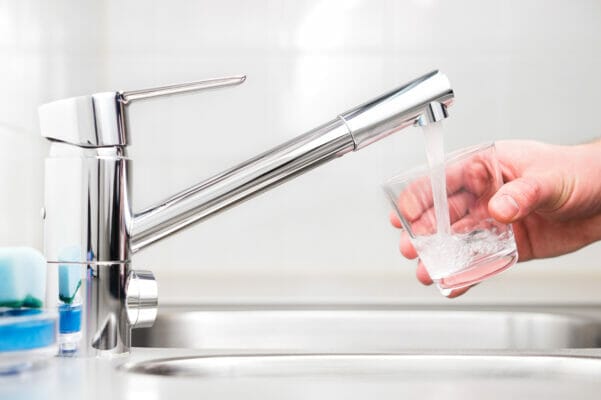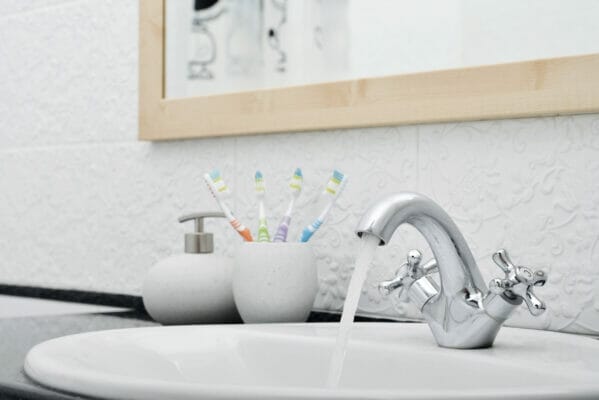Disclaimer: This post may contain affiliate links, meaning we get a small commission if you make a purchase through our links, at no cost to you. For more information, please visit our Disclaimer Page.
Bathroom water is the same as the water in your kitchen. The water generally comes from the same source. However, some homes may have several water sources. Kitchen water may be sourced from the national waterline, while the bathroom water sourced from a private borehole.

All buildings connected to the national water grid get water from one source. Therefore, it doesn’t matter whether you fetch the water from the bathroom sink or kitchen sink; it is the same.
Most people perceive that bathroom water is dirty and unfit for consumption. They also think that water from the kitchen sink is cleaner and safe for drinking. This perception is wrong. All water in the house is the same, as it comes from one source.
Do you wonder why bathroom water tastes different from kitchen water and vice versa? Read onto find out why and more.
Table of Contents
Why Does Water From The Bathroom Taste Different?
When taking a shower, sometimes some water gets into your mouth, and you taste it. Even before that, you taste bathroom water when brushing your teeth.
Of course, you drink kitchen water almost daily. When comparing the two, sometimes you will notice a slight difference in taste. Do you wonder why there is a taste difference even when the water comes from the same source?
There are several reasons water from your bathroom tastes different from all other water sources in the house. Here are some of these reasons.
Chlorine and Chlorine dioxide residue
Bathroom water contains no or trace amounts of chlorine and chlorine dioxide residue. Most bathroom water, especially in residential, comes from stored water rather than mains water.
Mains water, for instance, that from the national water lines, usually has chlorine and chlorine compounds added to it to kill germs and other harmful microbials.
Plus, water channeled to the kitchen has some of these chemicals added as well, regardless of the source. Bathroom water does not have any chemicals added since the assumption is that this water is not for consumption.
Piping
The pipes channeling water to your bathroom are different from those channeling water to the kitchen. The pipe material may affect how water tastes. You may get water from the same source, but the pipe materials may alter the taste.
For instance, if you use plastic pipes for the kitchen and metal pipes from the bathroom, water from the bathroom will have a noticeable metallic taste.
Material deposits inside water pipes
Material deposits such as lead inside the water pipe will change the taste of water. This is why you need to frequently check and clean the insides of your water pipes whenever possible. Interestingly, bathroom water pipes usually have more lead deposits compared to other pipes in the house.
Material deposits also include contaminants such as dirt, rust and even debris. Such components will change the taste of the water and make the water harmful for use. Therefore, always check and clean the nozzle of your taps often.
Type of water
Water going to the kitchen taps is filtered while that going to the bathrooms is not. This is why the taste is different. Kitchen water is usually filtered because we use it for cooking, washing fruits and vegetables and drinking.
Bathroom water is not filtered because it is not used for drinking, rather for cleaning.
Is Bathroom Water The Same As Kitchen Water?
Ideally, bathroom water is the same as sink water. As earlier stated, this water comes from the same source and therefore, regardless of whether you fetch from the kitchen or bathroom or laundry room, it should be the same.
However, bathroom water is not always the same as that in the kitchen and here is why. Sometimes, some individuals choose to connect their bathroom plumbing with a privately owned source of water, away from the main lines. These may include boreholes or stored rainwater.
In such a scenario, the bathroom water will be different from kitchen water.
Even then, it is more reliable to use water from the same source, say the main water line, rather than using rainwater.
You may run out of rainwater, especially during dry seasons. Borehole water may be full of or devoid of essential minerals. If full of minerals and salts, this water will probably spoil your water pipes unless you adapt the plumbing to salty water.
You may also find that sometimes, bathroom water is colder than kitchen water. It may also have a flatter taste. If this water is from a storage tank, don’t be surprised to find debris and other substances in your bathwater.
Especially if your bathroom tap nozzle has no filter. Kitchen tap water also tastes better because the kitchen taps are usually fixed with aerators which help mix water with air.

Can You Drink Tap Water From The Bathroom?
How many times have you found yourself drinking bathroom water in the middle of the night just because the kitchen is too far? Well, luckily, bathroom water is relatively safe to drink.
Remember that this water comes from the same source, whether you fetch it from the kitchen or bathroom.
Therefore, you can drink water from the bathroom tap. However, don’t make it a habit. This is because bathroom water, unlike kitchen tap water, is unfiltered.
Kitchen water is also treated with chlorine, which kills germs and inhibits the growth of toxic microbial. It is normal for some people to get grossed out when they think about drinking tap water from the bathroom.
Nonetheless, when brushing your teeth, you likely swallow a small percentage of this water, even when you don’t notice.
Another reason people think bathroom water is dirty is that ideally, the bathroom is a place where people use the washroom and shower. Drinking water from such places is not welcome for most people.
If you wonder whether it is safe to drink tap water from your bathroom, then here is your answer. It is relatively safe. Aside from the lack of filtration and chlorine treatment, bathroom water is clean.
With mineral content, bathroom water contains almost similar amounts of calcium, magnesium and other soluble minerals as kitchen tap water. However, kitchen water may have more, or less, depending on whether it has any additives.
This depends on whether the bathroom water is from the same source as the kitchen water.
You also have to note the kind of environment you are in before you drink bathroom tap water. For example, it is perfectly okay to drink bathroom tap water in your house since you know the source and how clean your taps are.
Nevertheless, if you are in an unfamiliar building such as a hotel, it is best to hold off the bathroom water and only drink bottled water. I am sure you cannot tell the source and the quality of tap water in any hotel.
Before taking this water, even if labeled safe to drink, ask yourself whether the pipes and the taps are clean enough and lead-free.
You also need to consider whether or not the water is from a storage tank where any contaminants can fall in or from the mainline.
It is noteworthy to mention that drinking from the hot water tap is not a great idea, tempting as it may seem. Here is why. Hot water from these taps is usually sourced from storage boiler tanks that can be heated and reheated many times.
Repeat heating, cooling and reheating provides a conducive environment for bacteria such as legionella to grow and thrive.
These bacteria can cause severe stomach upsets. For that reason, avoid the hot water tap, and always choose cold water instead. If you have to take hot water, use the kettle provided.
Conclusion
Tap water is usually from the same source, regardless of whether it is in the kitchen or bathroom. Even then, this water may have a slight difference in taste and mineral content.
It is best to drink tap water from the kitchen rather than from the bathroom. But, if the situation calls for it, don’t be afraid to drink bathroom tap water.
